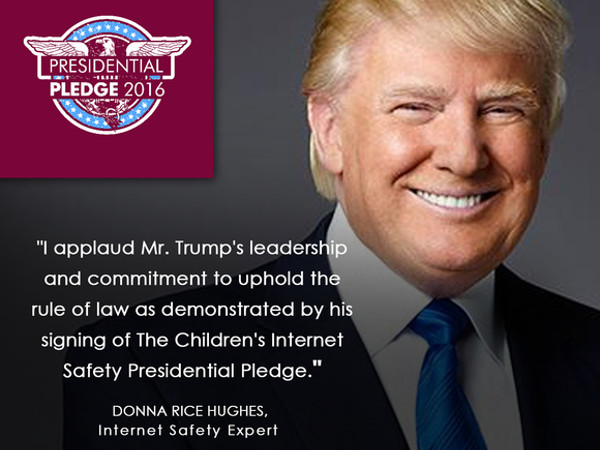Do Anti-Porn Groups Have New Reason for Hope?
 WASHINGTON – Amid the sound and fury attending the signing of his various executive orders, many of which appear designed to deliver immediately on specific campaign promises, one of President Donald Trump’s election season pledges has gone largely unremarked.
WASHINGTON – Amid the sound and fury attending the signing of his various executive orders, many of which appear designed to deliver immediately on specific campaign promises, one of President Donald Trump’s election season pledges has gone largely unremarked.
Trump signed the “Children’s Internet Safety Pledge,” a document authored by the anti-porn group Enough is Enough (EIE), in July 2016. Among other things, then-candidate Trump pledged to “uphold the rule of law by aggressively enforcing existing federal laws to prevent the sexual exploitation of children online, including the federal obscenity laws … by (a) appointing an Attorney General who will make the prosecution of such laws a top priority…”
In choosing Jeff Sessions for the post, has Trump appointed an Attorney General who will “make the prosecution of such laws a top priority” for his administration? EIE sure appears to think so.
“President Trump’s commitment to uphold both the rule of law and The Pledge is evidenced by his nomination of Senator Jeff Sessions as the 84th U.S. Attorney General,” said EIE founder, President and Chief Executive Officer Donna Rice Hughes in a statement released in late January. “The Trump administration is positioned to begin draining the cyber swamp by aggressively enforcing existing laws to prevent the sexual exploitation of children online, including the federal obscenity, child pornography, sexual predation and sex trafficking laws. Making the virtual square safer for all Americans is now possible for the first time in history.”
If draining the cyber swamp in any way resembles Trump’s approach to draining the Beltway swamp, one might be tempted to conclude a post in the Trump Administration has been reserved for Larry Flynt.
After all, Trump is the same guy who railed against Hillary Clinton for giving paid speeches to Goldman Sachs, then turned around and nominated or appointed several current or former members of the firm to his own White House team, including the investment firm’s former vice president Steve Bannon, former Goldman Sachs partner Steven Mnuchin and the firm’s former president and chief operating officer, Gary Cohn.
Of course, there’s arguably nothing new or unusual about members of Goldman Sachs securing plum positions in any presidential administration (like Henry Paulson, George W. Bush’s Treasury Secretary, for example) and there’s certainly nothing new or unusual about a politician saying things because they’re politically convenient, in lieu of philosophically consistent.
As such, we probably shouldn’t make too much of Trump following in the footsteps of his more conventional predecessors on this point. Either way, whether Trump drains the Washington swamp or merely restocks it with a more conservative brand of bureaucratic alligators, is Hughes right to think “making the virtual square safer for all Americans is now possible for the first time in history”?
I’d say the answer hinges on what you consider “safer” to mean — and to what extent you believe safety in this context can be achieved by the application of law.
Suppose for a moment the U.S. Department of Justice does initiate an obscenity crackdown under Sessions. Who, exactly, would they target?
Offhand, the most obvious answer is U.S.-based pornographers who operate sufficiently above-board they can be located, charged and prosecuted. By any stretch of the imagination though, targeting American porn producers will go only so far, particularly when the web’s most popular porn sites aren’t owned or operated by Americans to begin with.
Assuming one of Rice’s goals is to curtail access to porn by minors, it’s a problem on which there’s no reason to believe enforcement of federal obscenity laws would have an impact, no matter how “aggressive” the DOJ is in applying those laws.
To my knowledge, there’s hitherto been no such thing as extraterritorial enforcement of obscenity law (with respect to ostensibly legal adult pornography). Given the generally controversial nature of extraterritorial law enforcement, I’m not sure trying to take the owners of Pornhub on an international “perp walk” is where the DOJ would want to go next with the much-contested practice.
Anti-porn activists like Rice aren’t looking solely at the White House as a source for their renewed optimism in the culture war, of course. They’re also helping to push legislation at the state level, lobbying more states to adopt Utah-style declarations of porn as a public health hazard and the so-called “Human Trafficking Prevention Act,” an oddly-worded measure which, among other things, calls for all internet-connected devices to be designated “pornography vending machines.”
Will any of these measures succeed where past attempts to regulate online porn have failed (often following the stroke of a judicial pen declaring them unconstitutional), or will Trump and like-minded legislatures divine a means of regulating the unwieldy internet beast into submission?
If you think the answer is yes, riddle me this: If the Motion Picture Association of America and its allies in governments around the world can’t keep one damn torrent tracker down for longer than it takes for it to resolve at a new IP address, what makes anyone think Trump and Company can contain a far more popular phenomenon spread over literally tens of thousands of sites?
In other words, please pass to the left whatever it is you’re smoking, Ms. Hughes. The rest of us sure could use a few puffs right about now.
This is not to say a vigorous campaign to enforce obscenity laws would be of no consequence to those of us who happen to be Americans, especially for those indicted. But it would do nothing toward the stated goal of making the internet “safer” — and the effort would expend a lot of time, tax dollars and energy in total futility.
Then again, being told in advance something simply won’t work has never stopped Trump. Just ask any of his ex-wives, past casino-investment partners or the former New Jersey Generals … or Hillary Clinton.
One Comment
Leave a Reply
You must be logged in to post a comment.














Pingback: Do Anti-Porn Groups Have New Reason for Hope? – TripleXers Blog